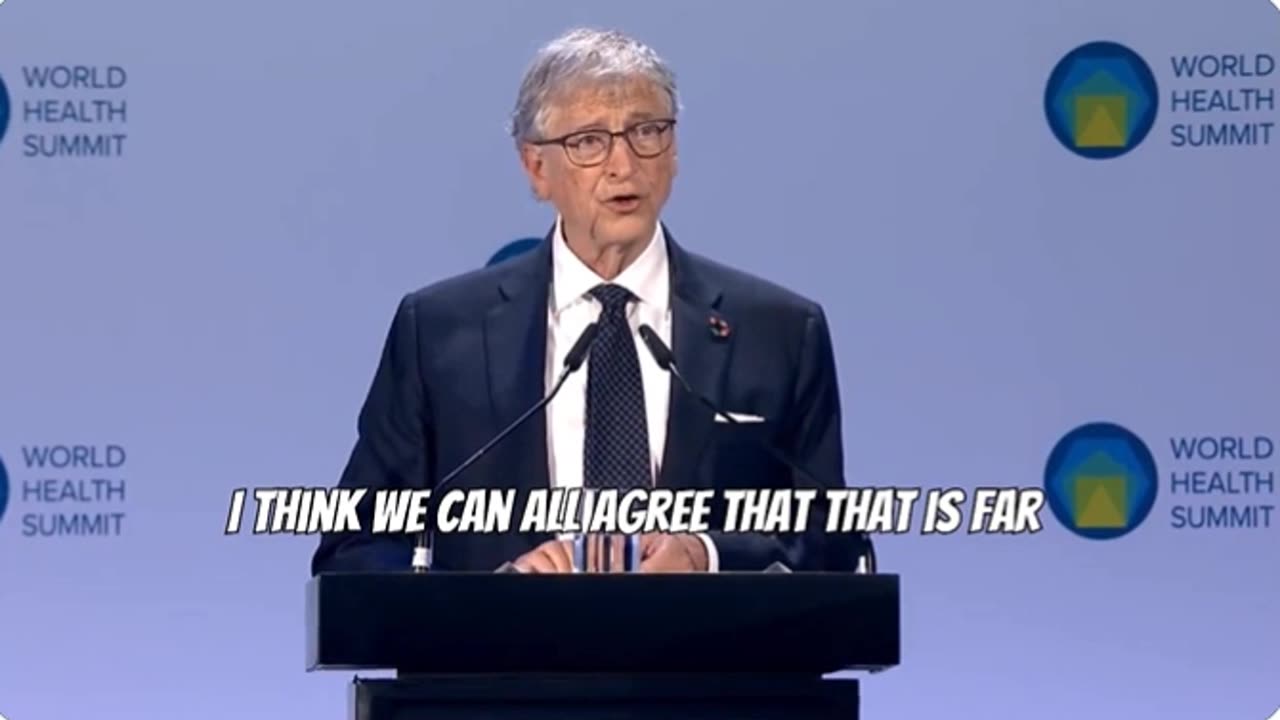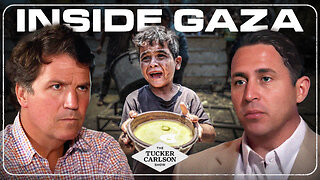Premium Only Content

Bill Gates at World Health Summit 2024: More Public Funds for Vaccines
Bill Gates addressed the 2024 World Health Summit a few days ago to make the call for more public funds to the WHO for their business plan of increasing vaccine delivery across the globe. He claims that more and "innovative" vaccines save lives. For example in Gaza, where children are dying in the thousands from the impact of violence, destruction of basic amenities etc, he claims one case of Polio leading to a mass vaccination program that halted the violence for some days, is what matters.
He makes zero mention of clean water, sanitation, access to fresh food and other basic public health interventions needed to save lives. Those interventions offer zero profits, although he is working on making water a taxable product, and growing food in laboratories, so that he can maximise his returns on the investment of your enslavement.
Meanwhile in poor nations, his pandemic business model has caused death and destruction and across the globe now, vaccine injury is becoming the biggest cause of growing morbidity and mortality. But he paints that as "saving lives" to the wealthy men in the room who also stand to profit from these plans.
______________________
World Health Summit 2024 - Bill Gates' speech: "Chancellor Scholz, Director General Dr. Tedros, Dr. Pries, thank you for hosting us today and for inviting me to share a few words with this esteemed audience. In my life, I've been very fortunate to participate in two societal revolutions. Twice, I've seen almost impossible ideas become reality. The first was 50 years ago.
When Paul Allen and I founded Microsoft, and we dreamed of a computer on every desk and every home. At that time, many people thought that was crazy, that it'd be impossible. But today we've gone even beyond that, where everyone carries almost a supercomputer in our pockets. The second societal revolution began about 25 years ago when I was transitioning to my second career in philanthropy.
At the turn of the century, I was stunned to find out that nearly 10 million children were dying before they reached their fifth birthday. I was a new father at that time. And when I saw that number, I was horrified. Back then, the idea that we'd be able to cut that death seemed as impossible and idealistic as the idea of personal computing. But in fact, that's exactly what happened. A single generation later, the number of kids who die before age five is now less than five million a year.
And I consider this, I think we should think of this as one of the greatest achievements in human history. And it's no coincidence that this revolution in global health began around the same time as we started several new global partnerships. GAVI, the Vaccine Alliance, the Global Fund to Fight AIDS, Tuberculosis and Malaria, and the Global Polio Eradication Initiative have collectively saved over 80 million lives.
And of course, The World Health Organization has played a central role in every major global health achievement of the past 75 years. The global eradication of smallpox, still the only human disease we've eradicated.
The near eradication of wild polio where we're down to just now two countries and that that's left. The response to COVID-19. Today, WHO continues to play a crucial role by gathering essential data on disease outbreaks and vaccine coverage, providing technical expertise, coordinating emergency responses, and setting the standards that other health institutions rely on.
We need the WHO to make sure that our risk of pandemic is kept very, very low because we saw what the cost of a pandemic was. The things WHO does, no country can do on its own. Together, WHO and these organizations provide a comprehensive approach to global health. Alongside partners like the World Bank's International Development Association, they are responsible for the unprecedented progress.
So global challenges need global solutions. And when we pool our resources, we bring together the expertise across sectors and geographies. We multiply the impact of those resources many times over. T
he Gates Foundation has supported global health R&D and health institutions as its top priority since its inception. And as we'll be celebrating our 25th anniversary next year, we'll make it clear that our support for these organizations is the best money we've ever spent.
And I believe that the citizens of every donor nation should feel the same way. But we should not feel complacent. The fact that childhood deaths are under $5 million a year is an achievement. But it's still 5 million children. And I think we can all agree that that is far too many.
It's been a quarter century since I was a new father, wondering if we could cut it in half. Today, I'm a new grandfather wondering if we can cut it in half again. And the answer is that if we're focused, if we prioritize this, we can. Now sadly, I don't think this is going to be easy.
We do have on our side lots of new innovations, ways of preventing women from getting cervical cancer, the HPV vaccine, ways of preventing women from getting HIV, a shot that you only have to take twice a year, a trial of a TB vaccine. I could go on and on. The innovation pipeline is as strong today for health and malnutrition as it's ever been in any time.
The limiting factor, therefore, is not the science. It's the funding. After decades of expanding, funding for global health is now contracting. This year, amongst the top donors, including EU, Germany, France, the US and others, over 9 billion has been cut from aid budgets. I understand the budget pressures. I understand the reasons that that happened. But that really challenges us.
And we really need to make the case that ideally that over time, as there's flexibility, these that we saw before. And you know, of course, we need this money to be focused on those most in need. You know, these health challenges are made even worse by climate change. And in fact, the best way to help support climate adaptation is the generosity, the aid generosity in areas like health and in agricultural innovations.
We have seen the share of aid going to Africa has gone from 40% to just just 25 percent. And so it's going to require us to drive the innovation faster and to make the case that over time the resources are needed. We see challenges. The pandemic was an interruption. The financial condition of many of these poor countries is tougher than ever. And so this, if we're not careful, we will reach a plateau.
We saw an example of that where in Gaza, we saw the first case of polio in over a generation. And so how do we think about this? Well, these great new tools are here, tools that can help mothers survive pregnancy, tools that can make sure kids grow up and their body and their brain develops fully.
So not only for themselves, but their country, they can get out of the poverty trap. They can do what we've seen many countries in Asia do, which is grow their economy and become self-sufficient. Vietnam, Indonesia are examples of countries with over 1.8 billion people who are now independent and funding most of their own health system.
We do have great vaccines coming along like RSV. We've got the HPV vaccine that will protect a generation of girls from cervical cancer as we receive appropriate funding. So we have to prioritize and we have to get these tools to the people who need them most. We know that investing in global health institutions produces very measurable results.
Cynics who say, hey, does aid really have impact? You know, we have very clear answers, you know, very well-known data that these healthy children, they survive, they attend school, up. Every dollar invested in global health produces over $20 in returns from increased productivity, lower health care costs and economic growth.
And that's something we should all celebrate, whether it's the moral cause of helping our fellow humans, whether it's creating stability to avoid unrest, whether it's growing the world economy. Whether it's preventing pandemics from breaking out in these countries that are not detected, that we saw was bad for the entire world, there are many, many reasons to stand behind all of these institutions.
Our foundation has supported global health for decades, including the WHO. In fact, since 2019, we've granted an average of $260 million to the WHO every year. And we like to make our grants as long as possible, typically three years or more. These multi-year commitments are the best way to support the organization because it gives them a clear roadmap to build up the capacity and really do their very best work.
I'm really excited that donor nations here are committing to both increased assessed contributions and voluntary contributions. After all, the World Health Assembly sets the WHO priorities. So it really is the member states that are stepping up for that funding. I'm thrilled to see, I would be thrilled to have other nations provide even more passing the Gates
Foundation in the WHO donor rankings because that would mean more lives saved. So this progress towards the UN goals, the sustainable development goals that include that idea of cutting childhood deaths in half are very exciting. We've slowed but we can go back to accelerating.
And leaders, hopefully they'll speak out because this is not bleak news, it's very good news. We don't want to turn the clock back in any way. We want to move forward and have these incredible improvements. So I want to thank all the leaders here stepping up to seize this opportunity. Thank you for your commitment to realizing a better, healthier future for people everywhere. Thank you."
VIDEO SOURCE: https://x.com/newstart_2024/status/1848684805904339133
-
 30:57
30:57
Alice Springs To Mind
2 days agoIs Trump a Material Witness to Jeffrey Epstein's Sex Crimes? | Whitney Webb
84 -
 LIVE
LIVE
LFA TV
13 hours agoLFA TV ALL DAY STREAM - THURSDAY 7/31/25
4,747 watching -
 LIVE
LIVE
JuicyJohns
3 hours ago $1.57 earned🟢#1 REBIRTH PLAYER 10.2+ KD🟢$500 GIVEAWAY SATURDAY!
137 watching -
 43:09
43:09
VINCE
2 hours agoSPECIAL: "Obamagate" DEEP-DIVE with Gen. Mike Flynn, Mike Benz and Paul Sperry
87.1K65 -
 LIVE
LIVE
The Big Mig™
3 hours agoFBI Burn Bags, Hidden SCIF’s & Truth About Mar-A-Lago Raid
5,170 watching -
 1:50:11
1:50:11
Dear America
3 hours agoFBI Discovers THOUSANDS Russia Hoax Docs In “Burn Bags”!! + Pelosi EXPOSED For Insider Trading!!
103K77 -
 1:27:12
1:27:12
Tucker Carlson
3 hours agoTony Aguilar Details the War Crimes He’s Witnessing in Gaza
71.6K125 -
 LIVE
LIVE
Badlands Media
6 hours agoBadlands Daily: July 31, 2025
4,074 watching -
 2:16:31
2:16:31
Matt Kohrs
12 hours agoHUGE Earnings Beat, Inflation Data & New Record Highs || Live Trading Options & Futures
28.7K2 -
 19:44
19:44
Bearing
3 hours agoWorld’s CRAZIEST Feminist Wants AMERICANS to WAKE THE F*** UP 🦅💥
18.2K35